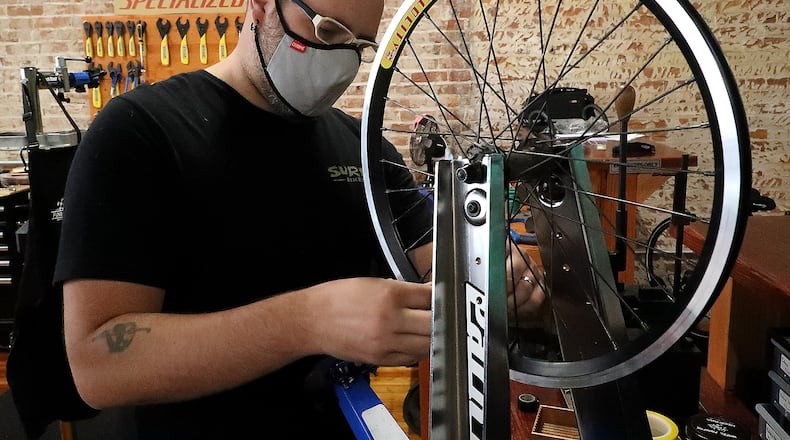“I do think that new business starts in Clark County in particular have been higher than they probably would have been normally,” Alex Dietz, the economic development coordinator for Clark County said.
He said that some individuals were forced out of work because of the pandemic, giving them time to reevaluate their work situation, and they decided to take a chance on their dreams.
“I think for a lot of people they’ve been quite successful in that,” Dietz said. “I think they found that it has been certainly a little bit of a gamble initially, but it has really paid off in the end.”
This year Ohio Secretary of State Frank LaRose’s office received 145,157 filings for new businesses and nonprofits through October, up from 130,621 filings for all of 2019.
A county-by-county breakdown is not available because the bulk of new business filings are limited liability companies that do not have to reveal the name or location of the owners, according to Maggie Sheehan, LaRose press secretary.
“Entrepreneurship is still alive and well in America,” said Roger Geiger, Ohio executive director of the National Federation of Independent Businesses.
It might seem counterintuitive that people would start new businesses in the midst of a pandemic that included a months-long shutdown and social distancing recommendations. But those interviewed said it makes sense that people would use this time to start something new, especially if they’ve been laid off or quit to care for children.
“When people are at home or there are extended layoffs, there seems to always be a rise in entrepreneurialism that goes along with that,” Horton Hobbs, vice president of economic development for the Chamber of Greater Springfield said.
He said he has worked with several new business owners in Springfield that probably would not have started a business prior to the pandemic because they did not have the time to think through their plan.
Among the new businesses that opened in Springfield this year were COhatch The Market and Cyclotherapy. Both businesses had plans to open this year prior to the pandemic.
COhatch, a Columbus-based company offering a variety of co-working options, private offices, event space, and restaurants, is located at 101 S. Fountain Ave. The company announced plans to renovate the old Myers Market in 2018 and construction began in 2019.
The offices, meeting rooms and co-working space opened in early March and the vendors began opening in May with carryout.
“It’s been a blessing,” Patrick Williams, operating partner of COhatch The Market said. “We are very thankful the people in Springfield and Clark County have continued to support what we are doing.”
Williams said due to the pandemic they had to cancel many pre-planned events, but were able to continue their co-working spaces and dining options. He said being able to do events like the Farmers Market has helped boost business for their vendors.
“We are trying to do what we can with the guidelines and respecting what is happening,” Williams said.
He said COhatch is hoping to host more events and to take advantage of the alley space between The Market and the Heritage Center.
“We feel really good about getting through this year, Williams said. “Ending up this year in the black was a big deal.”
Credit: Bill Lackey
Credit: Bill Lackey
Cyclotherapy, a bicycle shop located on W. High Street, opened at the end of April offering bicycle repairs, bicycles and accessories.
“We had a good season. We went over projection by about 20 percent,” Jon Francis, co-owner of Cyclotherapy said.
He said he would have liked to open the bicycle shop earlier, but they experienced unforeseen delays.
“We couldn’t have really opened any later than we did and it wouldn’t have even been a question of just being less successful, we just wouldn’t have made it,” Francis said.
Cyclotherapy had trouble getting product in due to shortages related to the supply chain, Francis said.
He said many people came to his business to buy bikes because of the pandemic.
In the future, Francis said he hopes to have repair classes and social events.
“It is a fulfillment of a dream,” Francis said. “I wanted to have a bike shop for many many years and it seems like it is working.”
Entrepreneurs and small businesses are often called the lifeblood of the economy, and Geiger said it is a positive sign that people are still taking that chance and starting anew.
“One of the leading indicators of economic recovery is start-up small businesses,” Geiger said. “Am I willing to say this is an indicator of a significant recovery? No. But it will happen.”
Only about half of start-ups survive past five years, and Geiger said initial start-up cost is about $5,000 for the average new business in Ohio. But people keep on taking the chance.
“There is no doubt starting and running a successful business is very difficult no matter where you are,” Dietz said.
“It really speaks for the business owners that have not only started new businesses in 2020, but continued to operate existing businesses. That really shows how resilient they are and their ability to sort of weather the storm that we’ve been through just this year,” he added.
Many new and established Clark County businesses have adjusted to COVID-19 guidelines by offering carryout or drive thru options, changing their hours or adding personal touches to their products.
“The community is still open for business,” Hobbs said. “While it may look different and it may be inconvenient, I don’t know if things will ever go back to the way it used to be pre-pandemic, but our businesses are giving it their best. We all, especially during this holiday season, need to remember the more we buy local, the more impact we have in the overall community.”
Hobbs said 63 cents of every dollar spent at a local business stays in the community. If the business is a locally owned, family business then it all stays in the community, he added.
“We are a community of hard-working people that value that mindset of hard work,” Hobbs said. “It is important for us to make sure we’re doing everything we can in the community to support that entrepreneurial development.”
Tips for new businesses
- Get professional help, including good accounting, legal, insurance and marketing advice.
- Know laws governing your business, including licensing, permits, fees and taxes.
- Establish an annual budget and stick to it.
- Your business plan should be realistic and include an exit strategy.
- Have a plan for growth, managing expenses, resources and inventory.
- Know your competition and differentiate your product or service.
- Marketing should include user friendly, attractive social media platforms and customer e-mail lists.
- Provide excellent customer service.
Source: National Federation of Independent Businesses




